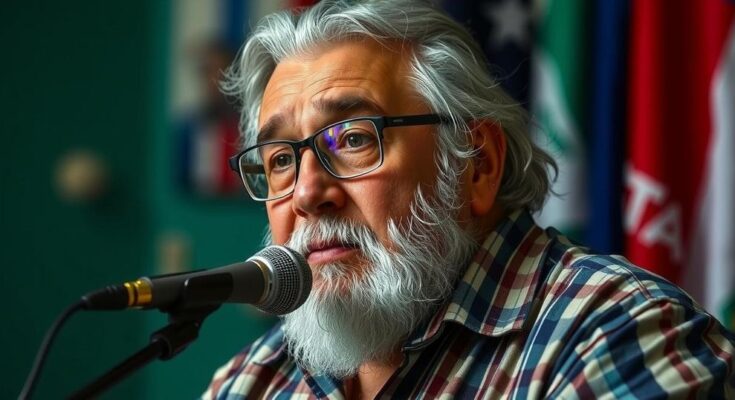Jose ‘Pepe’ Mujica, former President of Uruguay, has criticized the regimes of Cuba, Venezuela, and Nicaragua, highlighting the ineffective nature of their governance and manipulating electoral processes. He recognizes the discrepancy between the ideals of communism and the reality of democratic failures, particularly in the aforementioned countries, advocating for true respect for democracy.
Former Uruguayan President Jose “Pepe” Mujica has recently articulated his criticisms of the regimes in Cuba, Venezuela, and Nicaragua, specifically addressing these nations through social media, as his remarks were not broadcasted on Cuban state television. Mujica expressed disillusionment with the Cuban system, deeming it ineffective, despite recognizing that it follows a different framework compared to the other two nations. He stated, “That doesn’t work,” highlighting his belief that the current governance fails to meet its intended objectives. Mujica’s concerns extend to Venezuela and Nicaragua, which he accused of undermining true democratic processes by manipulating electoral results. He lamented, “It infuriates me when they play at democracy, hold elections, and then, depending on the outcome, they manipulate or commit fraud. That makes no sense.” Mujica distinguished the late Hugo Chavez from his successor, Nicolas Maduro, asserting that while Chavez accepted electoral defeat, Maduro’s regime exemplifies a disregard for democratic principles. Though Mujica identifies as a communist, he recognizes that the practical implementation of such ideologies has faltered, particularly in Cuba, which remains anchored to a failing socialist model while neglecting basic human rights and democracy. Mujica’s criticisms resonate with the tumultuous political landscape of the region, as he advocates for a true respect for democracy rather than a facade of it, leaving the Cuban populace enduring hardships such as prolonged blackouts and inadequate living conditions.
Mujica’s recent statements reflect dissatisfaction with leadership in Cuba, Venezuela, and Nicaragua, underscoring the complexities of governance in Latin America. His criticisms are rooted in a deep-seated historical context, given his own experiences during periods of political oppression. Despite sharing a political ideology with contemporary Cuban leaders, the stark contradictions in practice signify a significant schism between Mujica’s ideals and the operational realities in Cuba. This disparity illustrates the persistent struggles faced by these Latin American nations as they grapple with the legacy of revolutionary movements and their modern-day implications. Furthermore, Mujica’s background as a former political prisoner lends his commentary additional gravitas, marking him as a figure of moral authority in the discussions surrounding democracy in these nations. The confluence of his insight, historical context, and advocacy for genuine democratic governance makes his remarks particularly salient in the dialogue about the future trajectories of Cuba, Venezuela, and Nicaragua.
Ultimately, Mujica’s insights and forthright critiques lay bare the ongoing deception of democratic governance practiced by the authorities in Venezuela and Nicaragua while illustrating the dire inadequacies of Cuba’s enduring socialist framework. His vision for these nations is one anchored in authentic democratic values and accountability, challenging their leadership to reconsider their approaches and respect the will of their people. In light of Mujica’s perspectives, it becomes increasingly evident that true reform requires the courage to embrace democracy over autocracy, a principle that remains unfulfilled across these nations.
The recent remarks by former Uruguayan President Jose “Pepe” Mujica draw attention to the contentious political climates in Cuba, Venezuela, and Nicaragua. Mujica, a prominent figure in Latin American politics and a former political prisoner, has a complex history with these nations, especially Cuba, which was once seen as a beacon of revolutionary ideals. His recent critiques are significant given his past advocacy for democracy and social justice, as well as his unique insights into the failures of socialist governance that highlight the gap between ideology and practice in these regimes. As Latin America continues to navigate its political landscape, Mujica’s observations resonate with the desire for genuine democratic engagement and reform.
In conclusion, Mujica’s criticisms of the regimes in Cuba, Venezuela, and Nicaragua underline a broader narrative of disillusionment with failed socialist principles and the manipulation of democratic processes. His perspective reflects a longing for genuine democracy that respects the will of the people, contrasting sharply with the prevailing governance models in these nations. With his experience as a former leader and political prisoner, Mujica’s insights are a clarion call for accountability and reform, emphasizing the need for leaders in Latin America to embrace true democratic values and responsibilities towards their citizenry.
Original Source: havanatimes.org




